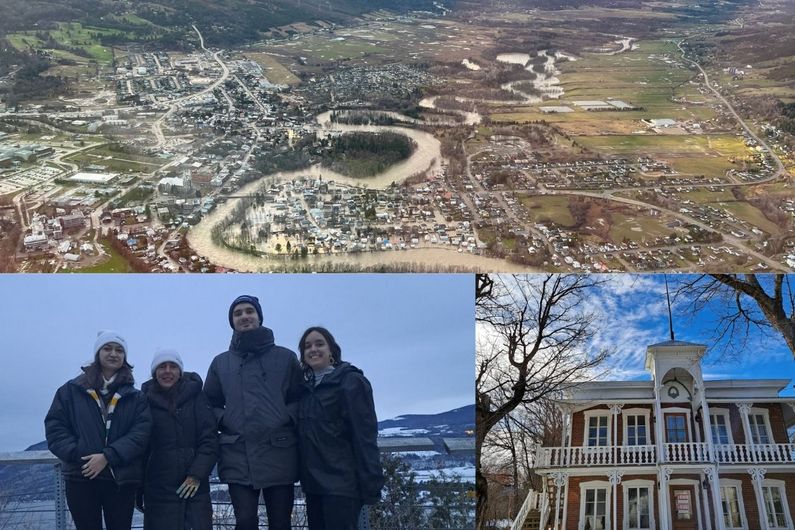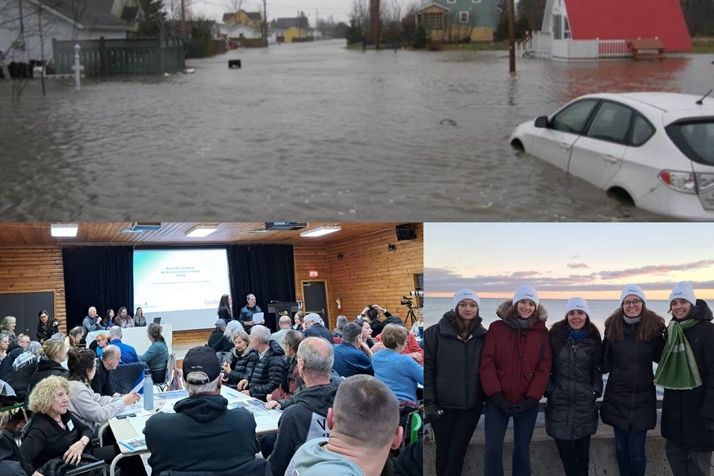Helping municipalities cope with flooding
- UdeMNouvelles
04/16/2024
- Virginie Soffer
Environmental designers led by UdeM professor and vice-dean Isabelle Thomas have developed RésiliAction, an assessment tool that promotes resilient land use where there's a risk of flooding.
After severe floods hit parts of Quebec in 2017 and 2019, researchers in Université de Montréal's Faculty of Environmental Design developed an assessment tool that estimates the resilience of projects built in flood zones.
Called RésiliAction, it's the work of a team led by Isabelle Thomas, the faculty's vice-dean, and in a short time has become a go-to tool for planners in regional municipalities working on land use and urban development.
"Adapting to climate change is crucial in Quebec, as it is around the world," said Thomas, a professor who teaches in the School of Urban Planning and Landscape Architecture. "Our research and activities aim to help people make decisions on land transformation projects that could have an impact on communities, the environment and the economy."
RésiliAction assesses resilience based on eight criteria, each with its own parameters and indicators weighted by importance—and all approved by the relevant Quebec government authorities.
Those criteria are: safety and environmental protection; risk communication; risk awareness; participatory governance; social equity; economic diversity; health; and social viability.
Flooded areas get help
In the Gaspé Peninsula, coastal erosion and flooding have hit the small municipality of Maria. One neighbourhood in particular faces an uncertain future after being flooded three times over the last several months. "We hope to work with residents there to design the best plan of action for their neighbourhood and municipality," said Thomas.
"It's really important that we provide them with the tools they need to adapt, as their experience will serve as an example for other communities. These tools complement our risk assessments and are used as part of a co-construction process. We want to show communities in flood-hazard areas that they aren't alone, that there are things they can do and that support is available."
To that end, her team, called ARIAction, is collaborating with Maria and Quebec's Public Safety Ministry on a research project and action plan to help the municipality prepare for future floods.
She and her team also recently visited the Charlevoix communities of Baie-Saint-Paul and Saint-Urbain to hear what residents there went through in early May of last year, when torrential rains led to widespread flooding.
"Hearing about their experiences helps us understand the challenges affecting areas threatened by faulty dykes, watercourse alterations and inappropriate land-development practices," Thomas said.
Mental-heath also being supported
RésiliAction also aims to shed light on how climate change is affecting people's physical and mental well-being. Partnerships are being developed to establish mental-health indicators to take into account when decisions are made.
"We know for a fact that the mental-health effects of climate change are currently underestimated," said Marie-Lou Bertin, a HEC Montréal business student and member of the ARIAction group.
Besides things like mould, foul water and polluted air affecting physical health, floods can result in mental trauma and grief when people are forced to flee their homes and relocate.
Empathy and caring are key to providing help in these situations, Thomas said. "We make a point of including health specialists in our workshops so that people and communities get adequate support.
"Supportive and empathetic communication is essential if we want people to understand and accept the upcoming changes. Our goal is to assist people as they come to terms with the fact that change is inevitable."
Expanding the program
With help from software developers, Thomas' team now plans to expand the RésiliAction's reach online – and even go commercial. The tool could be offered via subscription to muncipalities, for example.
It could also be handy in dealing with other climate-driven situations, such as droughts, forest fires and heat waves, said Thibault Clément, a member of the ARIAction group.
"RésiliAction is a valuable decision-making tool that combines two fields: community risk management and sustainable urban planning," he said.
"It promises to make a big difference for decision-makers and land-use planners, helping them ensure that projects take into account the various parameters necessary for resilience."
To learn more
RésiliAction will be presented in June at a two-day, French-language conference organized by the Faculty of Environmental Design and ARIAction. Called "Villes inondables : collaborations élu.e.s - chercheur.e.s pour la résilience de nos collectivités," the event will be held June 6 and 7 in the Faculty building's rooms 1150 and 1120, at 2940 Côte-Sainte-Catherine Rd. Tickets for admission (in per-person or virtual) can be purchased here.













